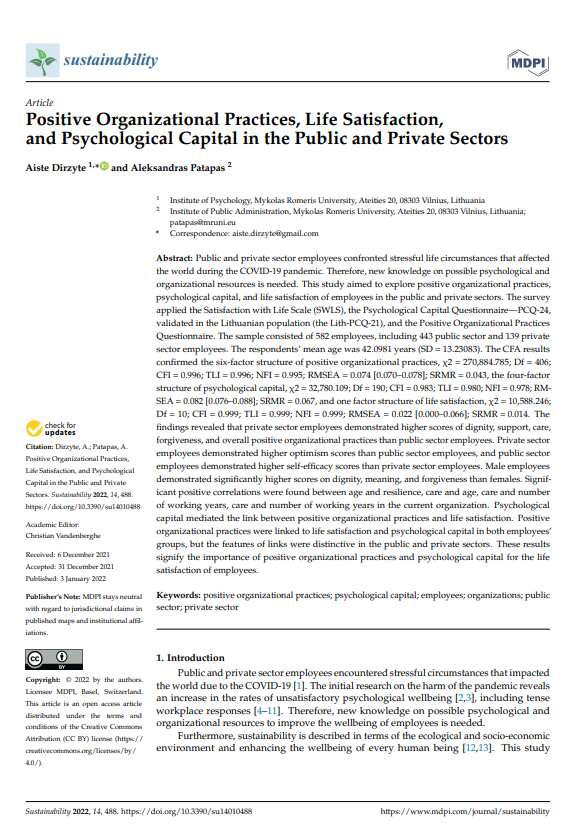¿En qué podemos ayudarte?
Positive Organizational Practices, Life Satisfaction, and Psychological Capital in the Public and Private Sectors

Tipo: artículo
Idioma: Inglés
Título: Positive Organizational Practices, Life Satisfaction, and Psychological Capital in the Public and Private Sectors
Public and private sector employees confronted stressful life circumstances that affected
the world during the COVID-19 pandemic. Therefore, new knowledge on possible psychological and organizational resources is needed. This study aimed to explore positive organizational practices, psychological capital, and life satisfaction of employees in the public and private sectors. The survey applied the Satisfaction with Life Scale (SWLS), the Psychological Capital Questionnaire—PCQ-24, validated in the Lithuanian population (the Lith-PCQ-21), and the Positive Organizational Practices Questionnaire. The sample consisted of 582 employees, including 443 public sector and 139 private sector employees. The respondents’ mean age was 42.0981 years (SD = 13.23083). The CFA results confirmed the six-factor structure of positive organizational practices, χ2 = 270,884.785; Df = 406; CFI = 0.996; TLI = 0.996; NFI = 0.995; RMSEA = 0.074 [0.070–0.078]; SRMR = 0.043, the four-factor structure of psychological capital, χ2 = 32,780.109; Df = 190; CFI = 0.983; TLI = 0.980; NFI = 0.978; RMSEA = 0.082 [0.076–0.088]; SRMR = 0.067, and one factor structure of life satisfaction, χ2 = 10,588.246; Df = 10; CFI = 0.999; TLI = 0.999; NFI = 0.999; RMSEA = 0.022 [0.000–0.066]; SRMR = 0.014. The findings revealed that private sector employees demonstrated higher scores of dignity, support, care, forgiveness, and overall positive organizational practices than public sector employees. Private sector employees demonstrated higher optimism scores than public sector employees, and public sector employees demonstrated higher self-efficacy scores than private sector employees. Male employees demonstrated significantly higher scores on dignity, meaning, and forgiveness than females. Significant positive correlations were found between age and resilience, care and age, care and number of working years, care and number of working years in the current organization. Psychological capital mediated the link between positive organizational practices and life satisfaction. Positive organizational practices were linked to life satisfaction and psychological capital in both employees’ groups, but the features of links were distinctive in the public and private sectors. These results signify the importance of positive organizational practices and psychological capital for the life satisfaction of employees.
Autores:
Aiste Dirzyte
Aleksandras Patapas
Publicación:
Sustainability 2022, 14, 488
Año: 2022
https://doi.org/10.3390/su14010488
Aportado por: José Carlos Sánchez García